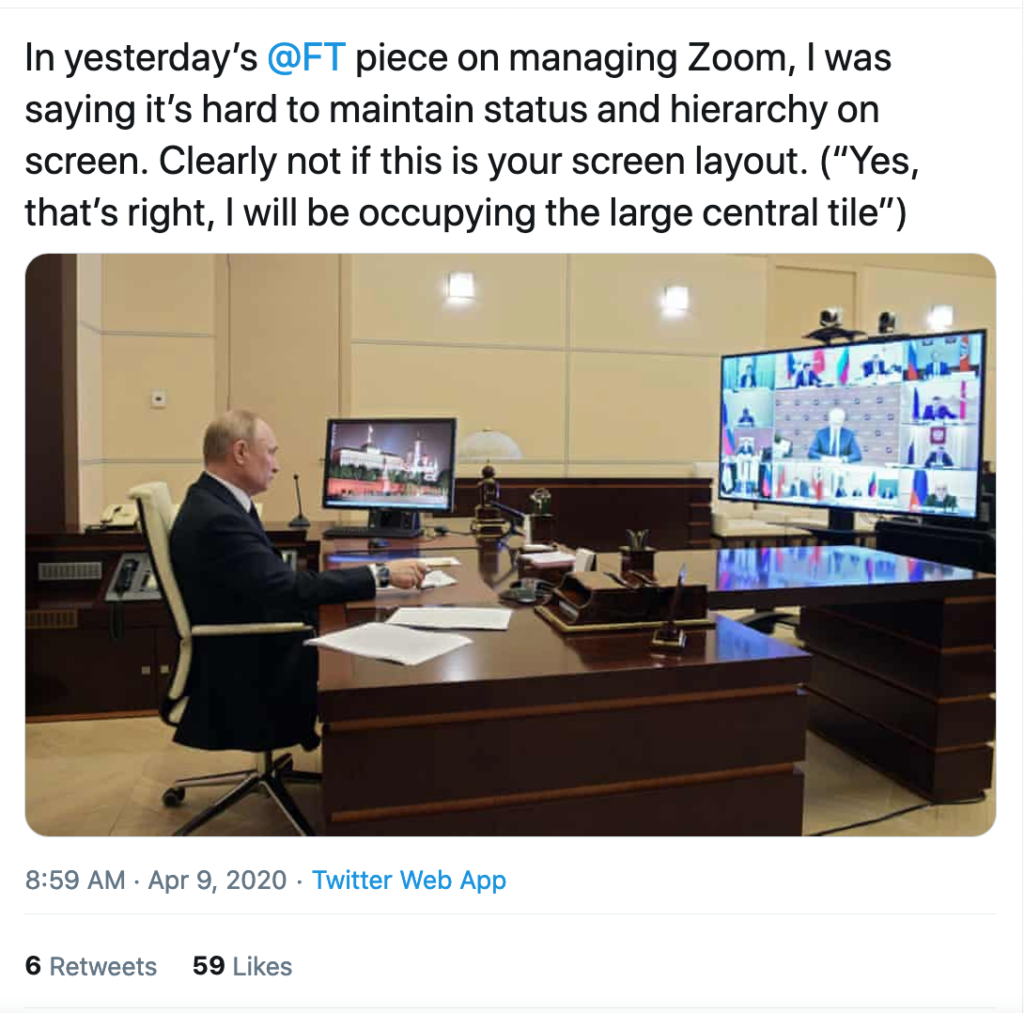The office of the future?
The skillset needed to run online meetings
Effective chairing of a meeting is one of the most valuable (and rarest) arts in organisational life. One of the things I’ve learned from the Zoom and WebEx meetings I’ve been participating in since lockdown is that, if anything, the skills of effective chairing are even more important now.
But in addition to the skillset necessary for the effective running of face-to-face meetings, one now also needs:
- a really good internet (fast and stable) connection
- up to date kit with (ideally) a big screen
- familiarity with the technical details and interface of the conferencing tool you’re using
- making sure that the conventions for speaking and intervening are understood by all participants before the meeting proper commences
- ensuring that you and the speaker at any moment are the only ones with un-muted microphones
- ensuring that every participant understands how to share (and un-share) their screens
Experience so far indicates that not every chairperson has these skills.
On the other hand, chairing an online meeting does give you one power that would be very useful in face-to-face meetings: you have the power to mute other people’s microphones!
Cory’s epiphany
Cory Doctorow is one of the most gifted and productive writers I know. I still remember an essay he wrote many years on how to write which contained a simple rule: Write for 20 minutes every day, rain or shine. I often cite this when students ask me for advice on writing — particularly about how to overcome writer’s block. In fact, it’s a rule that many great writers have always obeyed. Graham Greene, for example, wrote every morning — often no more than 250 words. But in his prime he was producing a novel a year. (Just do the maths and you’ll see how.)
Cory’s just published some new reflections (in Locus magazine) on ‘rules for writing’, and on what he’s learned from running classes for aspiring writers. Here’s the money quote from that essay:
Take exposition, which is something I love to read and love to write – when it’s done well. From Stephenson’s Cryptonomicon to Westerfeld’s Peeps, to Moby-Dick, I will happily read intensely technical, intensely interesting exposition all day long. The injunction against exposition isn’t a rule, but a warning: as delightful as good exposition is to read, most exposition isn’t good, and bad exposition is terrible.
It took me an admittedly very long time to reach this conclusion, and I think it’s because the standard wisdom goes something like, “In order to break the rules, you must first master them.” That threw me off. If, instead, the writers and books I’d learned from had said, “These things are much harder to get right, so if your story goes wrong, try replacing them with something easier,” I’d have come to my epiphany far earlier.
Spot on.
Why did Boris Johnson & Co screw up the UK’s response to the Coronavirus?
I’ve just been reading the extraordinary Guardian account of the shambolic attempt by the administration to overcome the country’s desperate shortage of ventilators to equip the NHS for the coming pandemic.
Nearly seven weeks later, things look very different. The NHS has neither needed 30,000 ventilators, nor has it come close to calling on the 18,000 that health secretary Matt Hancock set as a revised target in early April.
The inside story of what happened in this period is one of early panic and confusion, of companies with expertise clashing with those seizing the limelight with ambitions to innovate, of questionable designs, and the desperation of a government setting targets and then deciding it didn’t need to meet them after all.
At the root of it all was a government in a state of blind panic (understandable) issuing a ‘challenge’ to British engineering firms which had never made sophisticated medical equipment to switch overnight to designing and making them. Among other things, this suggests an administration which knew bugger-all about how complex machines are made, but was nevertheless confident that native British ingenuity would be able to rise to the challenge.
Aside from the panic, though, there was an air of gung-ho lunacy about the idea that a vacuum-cleaner manufacturer or a manufacturer of mechanical diggers would be able to magic-up some of the desperately-needed ventilators. So where, I wondered, did this mindset originate?
Here’s a clue.
On February 3 Boris Johnson, fresh from minting a new coin to celebrate Brexit, made a speech in Greenwich on making clear his views on Wuhan-style lockdowns.
“We are starting to hear some bizarre autarkic rhetoric,” he said,
“when barriers are going up, and when there is a risk that new diseases such as coronavirus will trigger a panic and a desire for market segregation that go beyond what is medically rational to the point of doing real and unnecessary economic damage.”
“Then, at that moment”, he goes on, “humanity needs some government somewhere that is willing at least to make the case powerfully for freedom of exchange, some country ready to take off its Clark Kent spectacles and leap into the phone booth and emerge with its cloak flowing as the supercharged champion of the right of the populations of the Earth to buy and sell freely among each other.”
Like I said, gung-ho lunacy, coming from the very top.
At the time, I thought that this was just another example of Johnson’s pathological frivolity. But a remarkable blog post by David Edgerton, one of Britain’s leading historians, who has published a number of works over 20 years which challenge conventional analyses of science and technology, puts it in a more illuminating context.
Edgerton’s thesis is that the government’s response to Covid-19 and Brexit are intimately connected. “Recognising this”, he says, “is vital to understanding the politics of both. Indeed as the trade expert David Henig has noted, we will know that the UK is really serious about Covid 19 at the moment in which is prepared to say that a Brexit extension is needed. That moment has not yet come, indeed it has been ruled out”.
At the beginning Boris Johnson stood behind ‘the science’ to justify a UK-only policy of ‘delay’ of the Covid-19 virus. This involved minimal intervention in what Johnson took to reminding us are the ‘freedom-loving’ proclivities of those ‘born in England’. Too late, what looked like a cunning plan to exemplify the virtues of the British way collapsed utterly. The UK is now broadly speaking following Europe and much of the rest of the world. ‘Following the science’ now sounds like a way of not answering legitimate questions.
But when it comes to ventilators, Edgerton says, “a Brexiter innovation-fixated logic applies”.
The current crisis has been an opportunity to illustrate the argument that the UK was a powerful innovation nation that could do very well without the EU. The government launched a programme, the details of which are still murky, to create new emergency ventilators. First off the stocks in the PR blitz was the Brexiter Sir James Dyson, who was teaming up with another Brexiter capitalist, Lord Bamford of JCB, to make many thousands. This, it turned out was just one of many projects to design new ventilators, and to modify others for mass production. There were lots of allusions to the second world war as if Spitfires had been conjured out of thin air in the heat generated by patriotic enthusiasm. It is telling too that the government decided not to take part in the EU ventilator procurement programme. This had to be a British programme for PR purposes, even though many of the companies making the components in the UK are European, like Siemens, Airbus, Thales ….
Edgerton points out an inconvenient truth about the wartime analogy, by the way: it’s baloney. The UK was a world leader in aircraft before the Battle of Britain. It had been making Spitfires since the late 1930s, and had huge long-planned specialist factories making them. “What is clear is that we are not in 1940. The UK is not a world leader in ventilator manufacture, far from it.”
It’s a great piece, worth reading in full. And it compellingly suggests that when Johnson & Co were claiming to be ‘following the science’, in fact they were simply expounding the ideology of British exceptionalism that underpinned the entire Brexit campaign.
Quarantine diary — Day 45
This blog is also available as a daily email. If you think this would suit you better, why not subscribe? One email a day, in your inbox at 7am UK time. And there’s a one-click unsubscribe button if you decide your inbox is full enough already.








